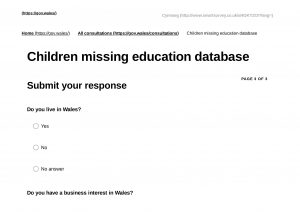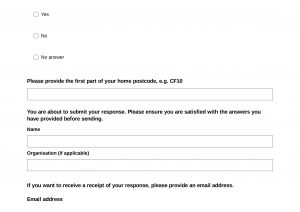NOTE, MAY 2025 – THIS PAGE WAS WRITTEN BEFORE THE RELEVANT LAW WAS COMMENCED AND THE SMALL SCALE PILOT BEGAN IN APRIL 2025. SEE https://edyourself.org/pilot-areas-wales-cme-database/ SEE ALSO WELLBEING BILL NOW APPLYING TO WALES https://edyourself.org/wellbeing-bill-applying-to-wales/ AS OF MARCH 2025
Update October 2024
On September 11th 2024 the Minister made a statement on next steps for the database, saying that “the database arrangements will be piloted across a small number of local authorities for the first year. The pilot will undergo a full evaluation, with any required changes made ahead of the proposed wider roll-out across Wales.” At the time of writing on October 1st there are no further details about the pilot. Analysis of consultation responses published at the same time in September can be found here.
Summary
Under new database proposals for Wales, local authorities will get information from health services about all school-age children in the area. The LA will put the names into a database of “children potentially missing education”. Names will be taken off the database when the LA confirms suitable educational arrangements. Being registered at a school will automatically count as suitable education. The Welsh government recognises that the database proposals engage children’s rights because children normally have a right to privacy and a right to have their say about decisions affecting them, plus they have a right to health which could be threatened if families stop using health services. The government promised a child-friendly version of the consultation documents so that children could give their views but this was never published on the consultation site. This consultation CLOSED on 25.4.24.
On January 31st 2024 the Welsh Government announced plans for each local authority to keep a database of Children Missing Education [CME]. The local databases would remain with individual local authorities; there would not be a single national database.
Introduction
The process would start with a list of ALL school-age children living in the local authority [LA] area supplied to local authorities once a year by Local Health Boards [LHBs] and family doctors. (The Health Boards in turn would have obtained their information from NHS services including hospitals and family doctors. According to this link, LHBs are responsible for dental, optical, pharmacy and mental health services) When the database was first proposed in 2020, family doctors would not have disclosed directly to the LA, read more here https://edyourself.org/data-sharing-childrens-database-wales/ and here https://edyourself.org/gp-data-half-a-million-children-wales/
LAs would check the list against PLASC which is the school census and includes nursery children – and the EOTAS census, plus those children notified to the LA as attending an independent school. Some of the children on the list would already be known to the LA as home educated but it is not clear whether there is to be some sort of vetting process where they are classified as “potentially missing”. Read more here https://edyourself.org/limit-of-cme-law-wales/
The LA will already know about home educated children who have previously attended a local school because the school has a duty to notify the local authority when it takes the child’s name off the school roll. However the LA may not know about children who have moved into the area or who have never attended school because there is no legal duty on the parent to inform the local authority.
The proposals as currently drafted will have a significant impact on home educated children already known to the local authority, read more here https://edyourself.org/wales-database-impact-children-already-known/
Public Consultation
There is a public consultation which is open for feedback until April 25th 2024. All currently available documents are linked from this page https://www.gov.wales/children-missing-education-database When the consultation was launched the Welsh government promised a child-friendly version of the consultation, scroll down to Children’s Rights heading for more detail.
- https://www.gov.wales/node/59753/respond-online
- Consultation document, HTML
- Regulations: The Children Act 2004 (Children Missing Education Database) (Wales) Regulations, file type: PDF, file size: 177 KB
- Integrated impact assessment summary: The Children Act 2004 Children Missing Education Database (Wales) Regulations 2025, HTML
- Children’s rights impact assessment (draft): The Children Act 2004 Children Missing Education Database (Wales) Regulations 2025, HTML
After the consultation closes if the government decides to take this forward, it is intended that there will be a pilot or test area with just a few local authorities for a year.
The consultation asks:
- Whether it is reasonable and proportionate and sufficient for local health boards to disclose name, address, gender and date of birth to the local authority
- Whether there are alternative ways of achieving the same goal
- The advantages and disadvantages of the proposed data disclosure [separate comment boxes for parents, children, health boards, LAs, and “other”]
- Whether an annual return is sufficient plus the cost implications of a more frequent data return [separate comment boxes for health boards, LAs, and “other”]
- Who at the LA would need access to the database
- Whether there are privacy risks, compliance risks, or corporate risks [questions for health services and LAs]
- Whether there are processes to ensure families of children who have died are not contacted inappropriately [questions for health services and LAs]
- About resource and technical implications [questions for health services and LAs]
- Whether there could be a disproportionate impact on those with protected characteristics
- Whether the current proposals would result in the Welsh language being treated less favourably
- Any other comments
As can be seen above, some of the questions are specifically directed at health services and local authorities rather than families or other interested parties although the consultation form does not ask for the category of respondent at the outset (which would have enabled the rest of the form to be tailored so that only certain questions appeared depending on earlier answers)
The last page of the consultation form asks for “name” – this would include the name of a child or young person who has responded – but it does not specify full name. It also asks whether you live in Wales and for the first part of your postcode. If you are responding on behalf of an organisation, there is a space on the form to specify the organisation. An email address is only required if you want a copy of your response. For those with concerns about confidentiality, the response form can be submitted without giving a name or postcode but it is not clear whether leaving these fields blank would mean the response counted for less.


Background Information
The proposals do not require a new Act of Senedd Cymru because database law is already on the statute books for England and Wales, it has just never been brought into force. It is intended that subordinate legislation will be introduced by way of an Order to bring section 29 of the Children Act 2004 into effect. Read more here https://edyourself.org/legal-powers-for-childrens-database-wales/ . Section 29 for Wales is the equivalent to section 12 in England which has also never been commenced. The English government scrapped these measures (called ContactPoint) in 2010.
There will also be 2 sets of new regulations setting out the provisions in more detail but only one set of regulations is linked to the present consultation and this is the draft CME database regulations which can be found here The regulations will require approval by resolution of Senedd Cymru and say that “A Local Health Board and GMS contractor must disclose to a local authority, within a period of 28 days beginning with 1 February each year, the information specified in paragraphs 1 to 4 of the Schedule that is held by it and relating to a child who is usually resident in that local authority’s area”. Read more here https://edyourself.org/details-childrens-database-wales/
Somewhat confusingly the second set of regulations related to independent schools supplying information is not provided with the present consultation; however the draft which appeared in a previous consultation in 2020 can be found here https://www.gov.wales/sites/default/files/consultations/2020-01/education-information-about-children-in-independent-schools-wales-regulations-2020.pdf The consultation document says “There are no proposed changes to the Education (Information about Children in Independent Schools) (Wales) Regulations save that the Schedule to those Regulations (for example, the information that an independent school is required to share) will mirror the Schedule to the database Regulations.”
The Impact Assessment says that the Welsh Government has not yet been able to establish the cost of the CME database, but recognises that there will be additional staff time involved in data processing, plus the possibility that newly-identified children might have Additional Learning Needs requiring an Individual Development Plan, noting that this “could increase workload and put financial pressures on local authority services as they would need to process any requests for determination of a child’s needs and provide for any subsequent additional learning provision”, adding that “some parents could request that their child’s needs are determined through the medium of Welsh which could put pressures on local authorities.”
Children’s Rights
A Children’s Rights Impact Assessment [CRIA] has been published with the consultation which can be found here It says ““Given the complex nature of this work, we intend to undertake a targeted consultation with children and young people on these proposals as this is likely to be more effective in gauging and collating views. A child friendly version of the consultation documentation will be prepared to support this engagement. ”
It considers the proposals against the United Nations Convention on the Rights of the Child [UNCRC] and identifies the following possible challenges – Article 12: Every child has the right to have a say in all matters affecting them, and to have their views taken seriously [because a child might object to personal data being shared]. Article 16: Every child has the right to privacy. The law should protect the child’s private, family and home life. Article 24: Every child has the right to the best possible health [because families might not register with a GP or use health services]
It says the proposed database “will require local authorities to record the name of any child where the LA cannot determine whether the education is suitable. The LA must then ensure that they have access to suitable education, either by provision of an appropriate school place or provision of EOTAS (education otherwise than at school). This will initially result in more children who are home educated being recorded as CME, and will prompt the LA to formally assess the education being provided.” It goes on to say that “the proposals will not impact upon the majority of home educated learners and their families as the local authority will normally have determined that a suitable and efficient education has been provided by their family. These learners will not be included on the CME database.”
It considers the impact on children with identified Additional Learning Needs [ALN] who have an Individual Development Plan [IDP]. “When the local authority reviews the child’s IDP, this will provide an opportunity to determine whether the education provided is suitable and efficient. If it is not determined to be suitable and efficient then this child would also be deemed to be a child missing education and the local authority would be required to take action to fulfil its duties under section 19 of the 1996 Education Act. This may result in learners with ALN receiving more support from the local authority, and learning opportunities that meet their specific needs.” (Presumably this means s 19A, as s19 applies to England only)
It highlights a possible risk of families failing to register with a GP in order to prevent their details being shared. The CRIA makes minimal reference to Gypsy, Roma and Traveller [GRT] children who it says should be included on the CME database if they are in employment rather than education.
